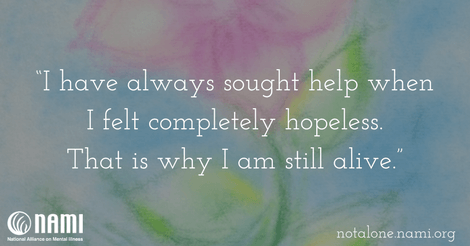June 06, 2017
By Kira Johnson
If you or someone you know is experiencing a mental health, suicide or substance use crisis or emotional distress, reach out 24/7 to the 988 Suicide and Crisis Lifeline (formerly known as the National Suicide Prevention Lifeline) by dialing or texting 988 or using chat services at 988lifeline.org to connect to a trained crisis counselor. You can also get crisis text support via the Crisis Text Line by texting NAMI to 741741.

*TRIGGER WARNING*
A 15-year-old student jumped off a bridge in Corning, NY today. I just made the mistake of reading comments on a news article covering the tragedy. They were both infuriating and completely off-base.
I just want people to know that when something like this happens, there are usually many factors building up to the event. It’s not the school’s fault, it’s not his friend’s fault, it’s not a bully’s fault.
I have been battling severe depression for decades. I have been suicidal more than once in my life. I can tell you from my experience and from those I have met in the same situation that there is never just one reason that people feel this way.
In my experience, most severely depressed people are found to have a chemical imbalance in their brain. This is a real thing, my friends. Just like diabetes or high blood pressure, it’s a bodily illness. The brain is—after all—part of the body.
Most depressed people I’ve met have had some sort of childhood trauma or family dysfunction. It might have been physical or sexual abuse, or just a failure of parents to adequately care for a child and make him/her feel safe.
The people I’ve met who thought suicide a viable option have usually been marginalized or bullied in some way by his or her peers for being “different.”
I have been diagnosed as bipolar II, rapid cycling, with major depression and PTSD. I’m not ashamed to admit this, because it’s not my fault. Sometimes it’s hard for me to distinguish what causes such profound sadness in me. My childhood was sometimes good, but my father was very abusive to our whole family—physically and mentally. I have horrible memories, as do my siblings.
I also have a chemical imbalance. I know this, because when I found the right medication, it really helped. It was obvious. Sometimes after a few years, the medication’s effectiveness wanes, leading to another bout of serious depression. It’s complicated, but it’s real.
Another factor leading to my depression is that I have no family to speak of. Mom died when I was 20. I still need her. I don’t have a spouse, and my kids will both be out of the house in a couple of short years. I’m socially isolated. I don’t really have any friends. And when you’re depressed, you tend to isolate yourself. It’s a vicious cycle. Chicken or egg-type stuff.
If you know me, you know that I am an intelligent, capable, honest and loving mother who worked hard since she was ten years old in the family store. I am still the person who graduated from an Ivy League school with high honors. I have raised two amazing daughters. I have had many successes in my career in communication and made valuable contributions in every position I’ve held. I also have been diagnosed with mental illness.
It is real, but it’s not contagious. I’m not a threat to anyone. I am on medication and I see a therapist. I am painfully self-aware. I have always sought help when I felt completely hopeless. That is why I am still alive.
Some people are not as fortunate. But their lives are no less valuable. Those who take their own lives are not “selfish.” In fact, in most cases, they feel as though they’d be doing the world a favor by disappearing.
Going forward, please think about what I’ve said and maybe even try to educate others to the fact that there are many more like me. If a small measure of understanding—instead of fear, condemnation, ignorance or accusation—can be extended to those with a mental health diagnosis, maybe we can stop someone before they jump.
We’re always accepting submissions to the NAMI Blog! We feature the latest research, stories of recovery, ways to end stigma and strategies for living well with mental illness. Most importantly: We feature your voices.
LEARN MORENAMI HelpLine is available M-F, 10 a.m. – 10 p.m. ET. Call 800-950-6264,
text “NAMI” to 62640, or email. In a crisis, call or text 988 (24/7).